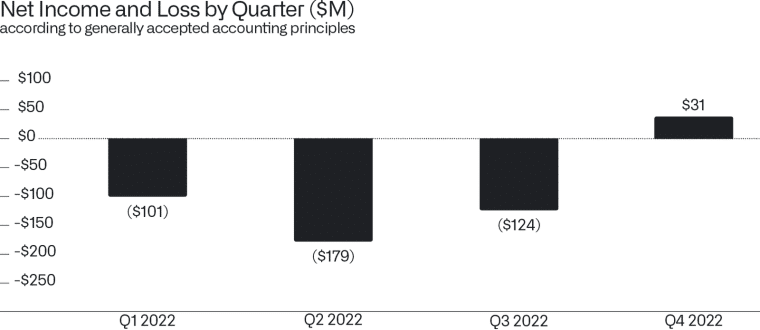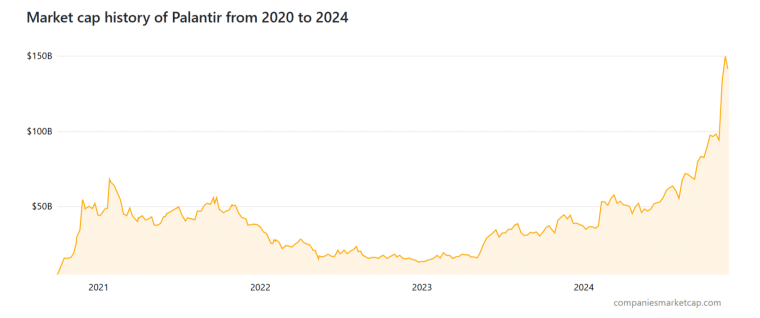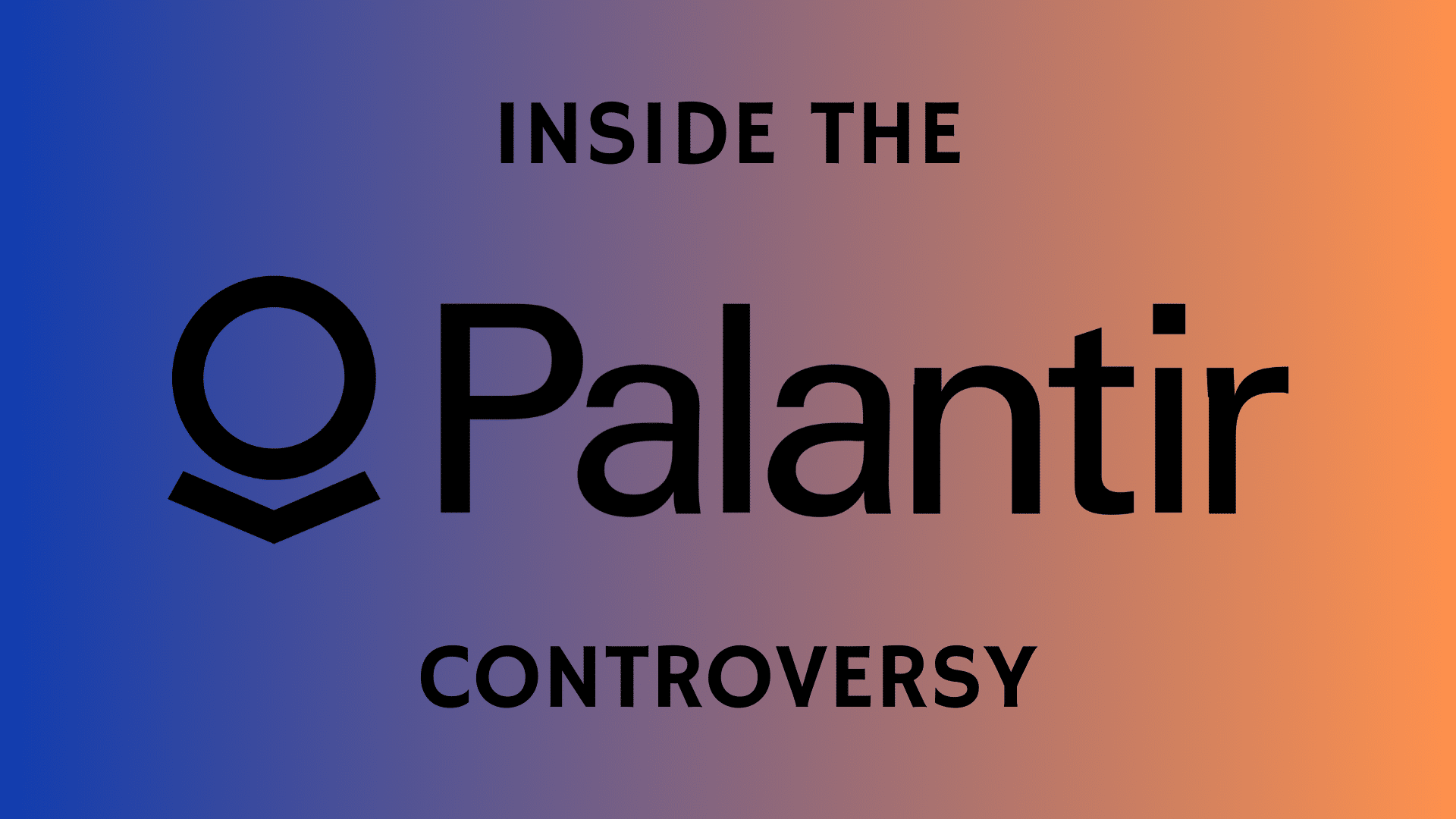The Palantir controversy escalated in 2019, as the tech company was looking to go public. Its partnership with the US Immigration and Customs Enforcement (ICE) faced criticism both from the general public and Palantir employees. Unlike other tech companies in the same situation, Palantir did not back off and defended its involvement in government contracts.
The other controversies around the company include a partnership with Israel, a contract with England’s National Health Service, and statements made by its co-founders.
Our Business2Community experts have rounded up Palantir’s controversies by analyzing news articles, interviews, and social media posts.
Palantir Controversy – Key Facts
- Palantir provided data-mining tools to US Immigration and Customs Enforcement (ICE), which activists claim contributed to family separations.
- The tech company openly supported Israel and even announced providing software for the country’s war-related missions.
- Several protests stemmed from these two instances. Activists blocked the company’s cafeteria entry, employees wrote a letter to the Palantir CEO, and human rights organizations asked the company to stop certain contracts.
The Story of the Palantir Controversy
Below is more information on Palantir and the main controversies surrounding the company to help you understand the story behind the headlines:
Background Information on Palantir
Palantir was founded by Peter Thiel, Nathan Gettings, Joe Lonsdale, Stephen Cohen, and Alex Karp in 2003. Its mission is to help intelligence agencies make better use of their data securely and responsibly. As of 2024, co-founder Alex Karp still serves as Palantir’s chief executive officer.
Between 2005 and 2008, the CIA was Palantir’s only client. The company then broadened its client list to include other US government agencies, police departments, intelligence and law enforcement agencies, and governments around the world. Palantir also has partnerships with major corporate clients. Throughout these partnerships, it aims to extend its platform’s reach. Some of these partner corporations are Accenture, AWS, Deloitte, Microsoft, and PwC.
Palantir went public in 2020, opening its shares at $10 on the New York Stock Exchange. The company’s revenue steadily increased after its IPO and it reported its first profitable quarter in 2022.

Palantir’s stock increased by over 250% in 2024. In late 2024, its stock outperformed Lockheed Martin, a leading defense contractor. According to The Motley Fool, Palantir’s success is due to various factors: high demand from US government agencies, fast client acquisition, and long-term contracts.
In addition to its growth in the defense industry, Palantir is also one of the biggest AI companies in the world, with a market cap of over $140 billion as of November 2024. This represents a big increase, as the company’s market cap was lower than $40 billion at the beginning of the same year.

US Immigration and Customs Enforcement Controversy
Palantir faced backlash for its contracts with the US Immigration and Customs Enforcement (ICE), both from its employees and the general public. ICE is responsible for tracking and deporting undocumented migrants in the US and was the enforcement agency during the family separation policy under Donald Trump’s first administration.
The tech company provided data-mining and digital profiling tools for ICE to be able to identify and track migrants. Its involvement with ICE dates back to 2014, when it was contracted to build an Investigative Case Management system to help agents visualize and organize records on immigration law violation suspects.
Palantir’s ICE contracts gained more attention over the following years, especially in 2019, a year before the company went public. This was the year when 70 activists blocked Palantir’s cafeteria in Palo Alto, holding slogans that said “Palantir drop ICE contracts”.
Also in the same year, CEO Alex Karp received a letter from his employees, which raised concerns related to the ICE contracts.

Despite the complaints, Alex Karp renewed a $42-million contract with ICE in 2019 and gave an interview with CNBC to explain why the company works with defense clients. “Silicon Valley is telling the average American ‘I will not support your defense needs’ while selling products to countries that are adversarial to America. That is a loser position,” wrote the company on X.
“Silicon Valley is telling the average American ‘I will not support your defense needs’ while selling products to countries that are adversarial to America. That is a loser position."
— Palantir (@PalantirTech) July 18, 2019
An Amnesty International report titled The Urgent Need for Palantir to Respect Human Rights, called for the company to stop its controversial contracts. According to the report, ICE used Palantir’s software for an operation that led to the arrest of over 400 caregivers and parents.
Various protests across the US took place. Slogans the protesters used included “Palantir Deports Families” and “No Tech for ICE”.
At Palantir's headquarters for the third week in a row, rallying w/@CloseTheCampsBA
Palantir just doubled down in supporting ICE this week by renewing their multi-million dollar contract
It's time for Palantir workers to choose side #TechWontBuildIt pic.twitter.com/n0sJ5XrvDZ
— Mijente 🐜🐜🐜 (@ConMijente) August 23, 2019
Palantir’s Israel Controversy
In 2024, Palantir announced a strategic partnership with the Israeli Defense Ministry. As a part of the partnership, both parties agreed to use Palantir’s technology in Israel’s war-related missions.
This move cost Palantir a major investor. Storebrand Asset Management, one of the leading investors in the Nordic region, said it “excluded Palantir Technologies Inc. from our investments due (to) its sales of products and services to Israel for use in occupied Palestinian territories”.
A spokesperson from Storebrand confirmed to Reuters that the investment firm held 262 million crowns ($24 million) in Palantir.
Palantir’s Israel controversy heated up after Peter Thiel was asked about a shocking report from local Israeli media outfits +972 Magazine and Local Call that explored the Israel Defense Force’s (IDF) use of AI systems for targeting suspected Hamas members. They spoke to 6 Israeli intelligence officers who told them that the IDF uses these AI systems to find targets but that they only spend about 20 seconds “confirming” the target, where they make a single check: “ensuring that the AI-selected target is male and not female.”
One of the systems, dubbed “Where’s Daddy”, is reportedly used by the IDF to target suspected militants and then bomb them once they reach their homes, which are naturally often full of innocent civilians. Some critics have argued that Palantir helped build these AI models, given that it develops these kinds of wartime targeting systems and shares at least some of this tech with Israel, though there isn’t any direct proof of this theory.
Fox Business reported Palantir CEO Alex Karp’s comments related to the conflict in the Middle East: “As far as I can tell, there are only three companies that have been publicly pro-Israel on Oct. 7. We have to do better,” said Karp.
Project Maven Controversy
In 2018, many tech companies were criticized for their involvement in military projects. Google’s Project Maven, a Pentagon project that involved using machine learning to identify potential targets, was one of them.
Google has Project Maven. Amazon has Rekognition. Microsoft has this ICE contract. Salesforce is modernizing CBP. Palantir is…Palantir. The entire tech industry is complicit, and fighting it requires us to organize throughout the industry, across roles, companies, and borders.
— Tech Workers Coalition (@techworkersco) June 19, 2018
Over 3,000 Google employees signed a letter protesting the company, saying Google should not be involved in war and asking the company to cancel Project Maven. After the backlash, Google dropped Project Maven and Palantir took over the contract.
Palantir co-founder Peter Thiel criticized Google’s decision and accused the company of treason. According to Axios, Thiel said “How many foreign intelligence agencies have infiltrated Google? Have the Chinese, in particular, infiltrated? And why are you working with Communist China and not the US?”
Then-president Donald Trump posted about Thiel’s claims and said that the Trump administration would take a look.
“Billionaire Tech Investor Peter Thiel believes Google should be investigated for treason. He accuses Google of working with the Chinese Government.” @foxandfriends A great and brilliant guy who knows this subject better than anyone! The Trump Administration will take a look!
— Donald J. Trump (@realDonaldTrump) July 16, 2019
Moving its Headquarters
Palantir moved its headquarters from Palo Alto to Denver in 2020.
In an interview with Axios, CEO Alex Karp said the reason for the move was the “increasing intolerance and monoculture” in Silicon Valley.
Palantir’s move took place after the Project Maven controversy, when Google backed off from a government contract.
“I had people protesting me. People protesting me, some of whom I think asked really legitimate questions. I’ve asked myself if I were younger, at college, would I be protesting me? And you know, it depends?” said Karp, referring to Palantir’s contract with the US Immigration and Customs Enforcement, which many employees protested.
$PLTR Supporting the US Government in Silicon Valley:
"If you're not willing to help the US government, you should work somewhere else."
– Palantir CEO Alex Karp pic.twitter.com/GNVXloI9q2
— Palantir Daily (@DailyPalantir) October 21, 2024
Controversies Around Palantir Founders
Palantir co-founder Peter Thiel is considered controversial for his political opinions and funding decisions.
He was one of the few Silicon Valley figures to publicly back Donald Trump in 2016, announcing he would donate $1.25 million to super PACs and Trump’s campaign combined. He also donated $15 million to JD Vance’s Ohio Senate campaign in 2022. Thiel’s support has been considered to be a serious leg-up for Vance — who was elected as the US Vice President in 2024 — helping to advance his political career.
Forbes reported that Thiel helped fund Hulk Hogan’s invasion of privacy lawsuit against Gawker Media in 2016, which resulted in the media company’s bankruptcy. Gawker had previously outed Thiel, with a 2007 story titled “Peter Thiel is totally gay”. The fact that Thiel used his money and power to drive the outlet to bankruptcy sparked criticisms. Many people argued that it implied billionaires could suppress journalism.
Palantir’s other co-founder and CEO Alex Karp has also made his share of controversial comments. “We have a consistently pro-Western view that the West has a superior way of living and organizing itself, especially if we live up to our aspirations,” he said in an interview with the New York Times. His opinions related to Israel and military contracts also received backlash.
NHS England Controversy
The National Health Service (NHS), England’s publicly-funded healthcare system, announced a £330 million (around $415 million) contract with Palantir in 2023.
As a part of this contract, the NHS said it would launch new software and operate the Federated Data Platform, powered by real-time data integration. The data involved includes wait lists, available beds, or the number of people in the hospital.
Palantir was considered a controversial choice because of various factors.
One of them was co-founder Peter Thiel’s Oxford Union debate, in which he said people have Stockholm syndrome with the NHS, where they think the organization is great while it actually makes them sick.
According to Eerke Boiten, a professor of cybersecurity who spoke to WIRED Magazine, Thiel’s comments sounded like he was supporting the privatization of the NHS. “I don’t want those people too close to the NHS data,” said the professor.
A large number of UK workers were concerned about the company’s stance in the Israel-Palestine war. Workers for a Free Palestine, a group of British workers supporting Palestine, shared videos from a protest, in which health workers called the NHS England to cancel the contract.
🚨 HAPPENING NOW 🚨
Health Workers For a Free Palestine are blockading NHS England HQ to protest their contract with Palantir, a US spy tech company that is resourcing Israel’s genocide against the Palestinian people.
Cancel the contract! ❌
No genocide enablers in the #NHS! pic.twitter.com/ofGkuM11SF— Workers for a Free Palestine (@Workers4Pal) April 3, 2024
Similar to the healthcare workers, the British Medical Association, a professional association for doctors and medical students, called Palantir’s involvement “deeply worrying”.
Cambridge Analytica Controversy
Cambridge Analytica is particularly known for the Facebook data scandal, in which it collected users’ personal data on Facebook to show them politically-targeted ads.
According to whistleblower claims, Palantir worked with Cambridge Analytica while it harvested data from Facebook. Although there was no official contract, the whistleblower alleged that Palantir staff helped build algorithms using Facebook data to target voters during political campaigns.
Palantir denied the claims, and made the following statement to TechCrunch:
“Palantir has never had a relationship with Cambridge Analytica nor have we ever worked on any Cambridge Analytica data.”
TechCrunch reported that Palantir confirmed a staff link with Cambridge Analytica in another statement. “We learned today that an employee, in 2013-2014, engaged in an entirely personal capacity with people associated with Cambridge Analytica. We are looking into this and will take the appropriate action,” it said in an NYT report.
What Can We Learn From the Palantir Controversy?
Here are three lessons from the Palantir controversy that apply to smaller-scale businesses and founders:
- Founders’ political opinions can affect brands: In Palantir’s case, founders’ opinions directly impacted the protests. Peter Thiel supporting Donald Trump (and various extreme political stances) and Alex Karp calling out American companies who did not speak in support of Israel are two examples. Case in point: after NHS England announced a deal with Palantir, several pro-Palestine workers protested, saying they didn’t want Palantir software in their healthcare system. There is no right or wrong answer to whether brands should get involved in politics. There are some best practices on what to do when you do take a stance — know your audience, consider your stakeholders, and be ready to explain your point of view.
- Your work defines your company identity: The biggest controversy around Palantir is its work with the US immigration enforcement agency. Human rights organizations have urged Palantir to stop, saying its work contributes to the separation of migrant families. This may be one of the factors England-based NHS patients expressed concerns about the company handling their data. When involved in controversial projects, companies may choose to stop the contracts or stand by them. No matter what decision you make, it’s important to know that partnerships become a part of your brand. In Palantir’s case, the company is known for providing artificial intelligence and software solutions to defense clients.
- Anticipate backlash in certain industries: Palantir operates in controversial industries, such as defense and data management, where people have varying opinions. Businesses in similar industries must plan ahead and develop systems on what to do in case of criticisms.
